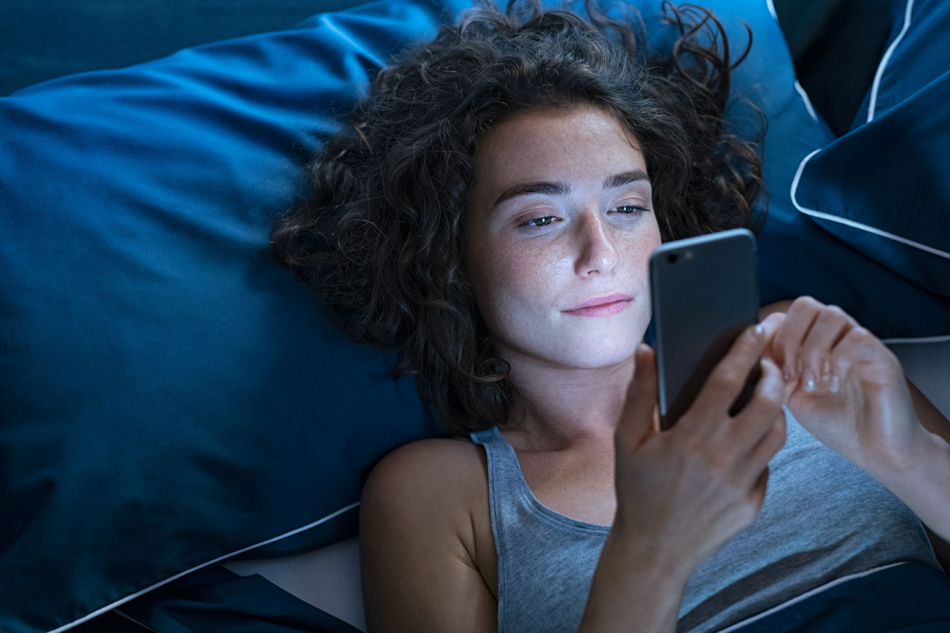We hear it again and again: Avoid devices before bedtime to sleep properly. Research and sleep specialists say late-night scrolling and streaming stimulate your brain, delaying sleep and preventing quality rest. Electronic light disrupts your body clock and sleep. The recommendation is simple—stop using devices an hour or two before bedtime—but we don’t always follow it. We know we shouldn’t be scrolling through Instagram or watching a show before bed, but we do. Screens are everywhere, so it’s difficult to unplug in the evening.
Well, if you really can’t get away from devices, there is at least a healthier way to do it. Jade Wu, Ph.D., a board-certified behavioral sleep medicine specialist and author of Hello Sleep, says you can use screens at night without disrupting your sleep with a few adjustments to your daily routine.
Get as much light as possible during the day
Dr. Wu’s first piece of advice is to get enough daylight. You have to understand your sleep-wake cycle, or internal body clock, to grasp why this is important. Melatonin, a hormone that governs sleep, rises at night and falls in the morning and throughout the day. “Melatonin is a time-keeping hormone that tells your body when it’s time to be sleepy and it naturally responds to the amount of light in the environment,” Dr. Wu told SELF. Your brain releases melatonin at night, making you sleepy. Light, whether natural or artificial, tricks your brain into thinking it’s sunlight and suppresses melatonin, keeping you awake.
Dr. Wu says the brain needs a large light contrast between day and night to keep your body clock on track. If you’re outside all day, come home, snuggle under the covers, turn off the lights, and read a book on your tablet, the quantity of light you’re exposed to will still be very different. Your nocturnal screen use won’t disrupt your sleep as much as if you worked inside with the curtains closed all day. Dr. Wu says your brain tracks how much light it receives each day. “If, five hours ago, there was a lot of light, and now there’s some light from your screen but much less, the brain will still know that it must be evening now, even though there’s still light coming through,” she explains.
Some alternative ways to get more midday light if you don’t have an outdoor job: Sitting beside a window, taking lots of outside walks, and using bright lighting in your home office.
Turn up the lights at dinnertime
Dr. Wu also recommends increasing light exposure around dinnertime to mitigate the detrimental effects of late-night screen use. She suggests turning on your lights a couple of hours before night if you’re a device addict (around 7 p.m. if you turn in at 10, for example).
A brief burst of intense light two hours before bed is the goal of inducing sleep: If you can, watch the sunset or prepare or eat in the kitchen with bright lighting. “Earlier in the evening, you’re briefly injecting yourself with some light so that your body is prepared to make a contrast later in the evening when there is going to be less light,” Dr. Wu explains.
Be mindful of how you use your screens
Even if you follow the previous two measures, streaming a show that makes you nervous, like a real crime series that raises your heart rate, may disrupt your sleep. Dr. Wu believes screen content is as important as light exposure.
Of course, this is particular to the person. Make a note of the forms of entertainment that soothe and agitate you. However, that’s not to say that relaxing means boring. Dr. Wu warns that boredom can frustrate and excite the brain, making it harder to fall asleep. She believes relaxing means intriguing, enjoyable, thought-provoking—whatever it is, just not super stimulating.
One more thing: Using numerous devices at once—e.g., messaging your BFF while watching Netflix and scrolling through TiKTok—can overwhelm your eyes with extra light, suppressing melatonin, and hyper-stimulating your brain. Dr. Wu thinks media multitasking makes it tougher to relax for sleep, so if you must use a screen, limit it to one.
Wear blue-light-blocking glasses
Research suggests that blue light at night is the biggest threat to circadian rhythms. Phones and tablets generate blue light, which lowers brain melatonin production more than orange and red light. Dr. Wu adds that not all light frequencies stimulate the brain and circadian rhythm.
She recommends blue-light-blocking eyewear. They can prevent blue light from disrupting sleep and maintain melatonin production. Dr. Wu recommends buying glasses with orange, yellow, or amber lenses to prevent blue light.
You want a strong day-to-night contrast, so don’t wear blue-light-blocking glasses all day unless your doctor advises it. Dr. Wu warns against wearing blue-light-blocking spectacles 24/7. She claims we require daily light stimulation for circadian rhythm, sleep, emotion, alertness, metabolism, and more.
We are highlighting this piece as part of our annual “Best Of” roundup of articles published at The Optimist Daily this year. Today’s focus is on the top Health solutions of 2023.











